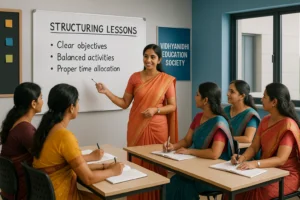
Source : footprintseducation
The Kindergarten Method of Teaching is a keystone in early childhood education, determining the foundational years of children aged between two to five years. This method, entrenched in fetching, play-based knowledge, highlights the holistic growth of children. Through the Kindergarten Method of Teaching, teachers create a fostering atmosphere where inquisitiveness and creativity flourish, and social skills are established.
The significance of the Kindergarten Method of Teaching cannot be exaggerated, as it sets the phase for an enduring love of learning, motivating children to discover, question, and determine the domain around them in a helpful and organized setting.
Montessori Method
This teaching approach is different from the traditional approach and emphasizes child-led learning, allowing children to choose activities that match their interests and developmental stages. To encourage hands-on learning and exploration, Montessori classrooms consist of different materials which quite interesting for kids. For example, a child may choose to work with a set of counting beads, fostering an understanding of numbers and quantities at their own pace.
To get complete details of the ECE Course Call / WhatsApp at +919869546913 / +919869866277.
Click Here, to download the ECE Course brochure!
Waldorf Method
Waldorf method integrates arts, academics, and practical skills and focuses on educating the whole child – head, heart, and hands. A typical activity might involve storytelling, followed by drawing and acting out the story, which enriches imagination and emotional intelligence.
Reggio Emilia Approach
Reggio Emilia Approach views children as knowledgeable, imaginative learners and emphasizes project-based resourceful learning. Projects are often inspired by the children’s interests. For instance, if children show curiosity about insects, the class might start a project that includes researching, observing, and creating art about insects.
High Scope Method
High Scope method practices active participatory learning, where children have direct, hands-on experiences with people, objects, events, and ideas. Children’s daily routine includes a plan-do-review sequence, empowering them to plan their activities, carry them out, and then reflect on them, fostering independence and critical thinking.
Play-Based Learning
This approach is centered around the belief that children learn best through the exploration of play. Educators create engaging and interactive environments where children learn academic and social skills through structured play. An example is setting up a mock grocery store to teach math skills like counting and addition.
Steiner Method
The Steiner method mainly focuses on the importance of nature and imagination this technique is similar to Waldorf. Here the activities often involve outdoor learning and creative play, such as gardening or nature walks, to cultivate a connection with the natural world.
Bank Street Approach
Bank Street Approach is an interactive and development approach that believes in learning through multiple perspectives. This approach leads to experiencing the role-play of the community helper to build a deeper understanding, incorporating field trips, and interviews.
Project-Based Learning
This method involves children experiencing complex, real-world projects or activities through which they develop and apply skills and knowledge. An activity on water conservation could integrate science, math, and social studies, culminating in a presentation to the community.
Thematic Learning
Educators integrate multiple subjects under a single theme, making learning more cohesive and meaningful. For example, a “Space” theme could include reading stories about space, counting stars, creating art depicting planets, and singing songs about the solar system.
Integrated Learning
This approach blends various subjects into a comprehensive learning experience. For example, a lesson on the lifecycle of a butterfly might include reading a story that focuses on literacy, observing caterpillars including science perspective, and charting growth lead to math intelligence.
Each of the above-mentioned Method of Teaching offers a unique focus and strategies and contributes to the overall development of the child. Integrating these methods into the learning journey of kindergarten children ensures an elevating, diverse, and all-inclusive approach toward teaching in early childhood education.
With its emphasis on playing, exploring, and hands-on learning, the Kindergarten Method of Teaching has proved to be foundational in developing a love for learning in children.
To get complete details of the ECE Course Call / WhatsApp at +919869546913 / +919869866277.
Click Here, to download the ECE Course brochure!

Source : guildhurstschool
Kindergarten Teacher Courses
Kindergarten Teacher Courses offered by Vidhyanidhi Education Society (Govt. regd.) equip educators with the necessary skills, and knowledge along with the Kindergarten Method of Teaching to be effectively implemented in kindergarten classrooms.
Kindergarten Teacher Courses from VES come with a multitude of benefits designed to accommodate the modern learner’s needs offering flexibility in learning.
Here’s what makes these Kindergarten Teacher Courses stand out
Globally certified ECE Course
Certification provided to aspiring educators after completion of the Early Childhood Education course is widely accepted, opening doors to international opportunities as well.
Entire Early Childhood Education Course Online / Distance
Online and Distance learning options are the most convenient ways to pursue further study and acquire skills it provides flexibility to balance other commitments and allows learning at your own pace.
No examinations
To make the learning process interesting and valuable with less pressure, the traditional examination method is eliminated.
Assignment based evaluation
Evaluation of trainees is assessed through practical assignments, ensuring that the performance reflects their understanding of real-world teaching competencies.
Designated Course Coordinator for thorough guidance
Personalized guidance is provided throughout the course by a course coordinator to enhance understanding and application of the Kindergarten Method of Teaching.
Certificate without the term Online/Distance mode of study
Trainees receive a certificate of early childhood education that does not mention the mode of study, maintaining the value and recognition of their qualification.
The Kindergarten Teacher Courses from Vidhyanidhi Education Society (Govt. regd.) offer a blend of knowledge and flexibility making it convenient for aspiring teachers to get certified and also ensure that trainees are well-prepared to employ the Kindergarten Method of Teaching.
With a focus on holistic development and play-based learning, which are critical in shaping the educational journey of young kids. By acquiring certification in Early Childhood Education courses, educators are pacing into a creation of opportunity, ready to make a noteworthy influence in the field of early childhood education.
Transform early education with Vidhyanidhi Society’s course! Join now & shine!
Call / Whatsapp on +919869546913 / +919869866277, for details of the Early Childhood Education Course.
Click Here, to download the ECCE Course brochure!
Kindergarten Method of Teaching
FAQs
Which course is best for Kindergarten Teacher?
An early childhood education course is the best course for aspiring kindergarten teachers offered by Vidhyanidhi Education Society.
What is the salary of a Kindergarten Teacher in India?
The salary of a Kindergarten Teacher in India varies widely, ranging from ₹1.5 to ₹4.5 lakhs per year, depending on experience and location.
What is the Qualification for Kindergarten Teacher?
Qualifications for a Kindergarten Teacher demand for minimum HSC of education along with a diploma in Early Childhood Education.



